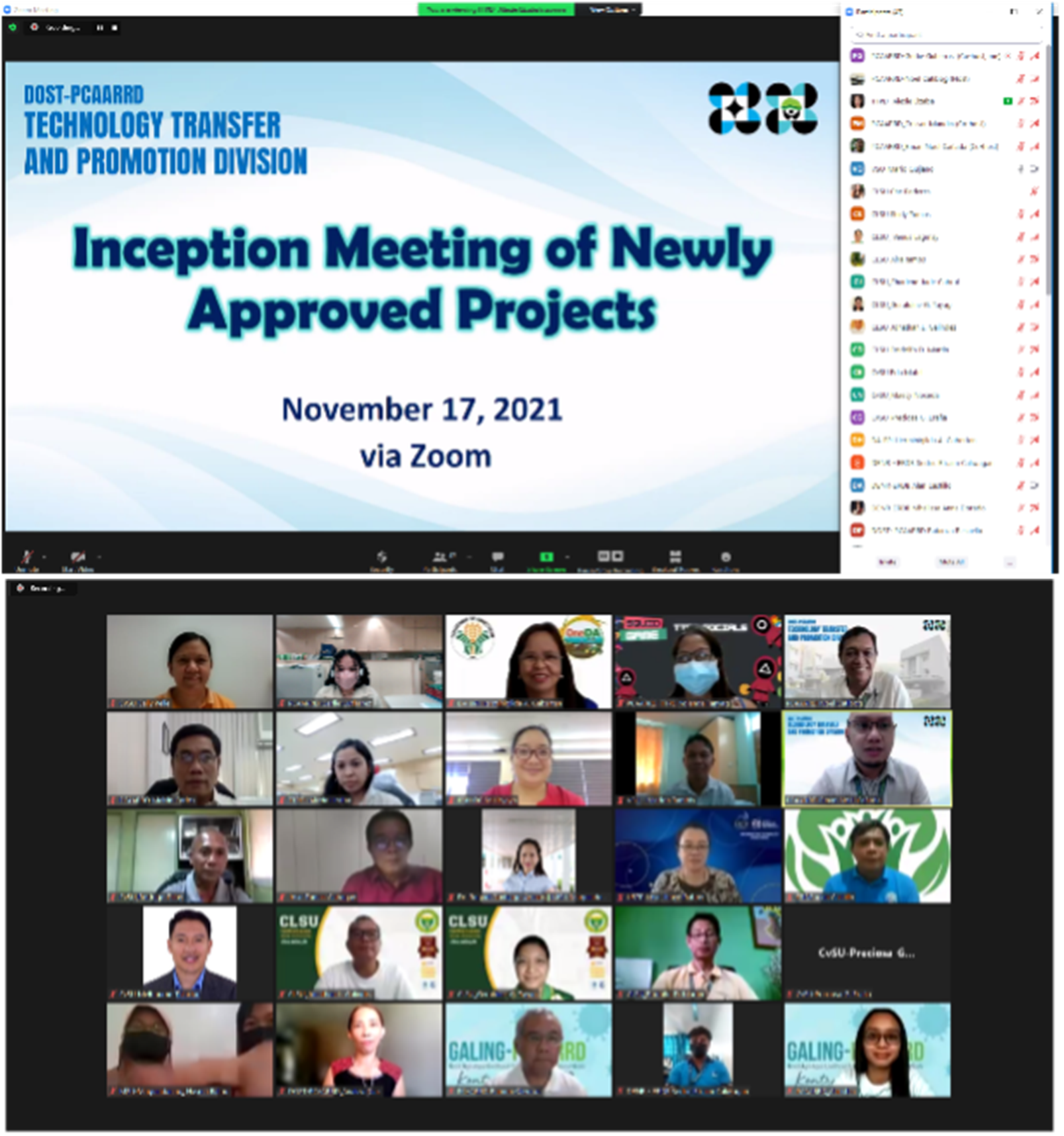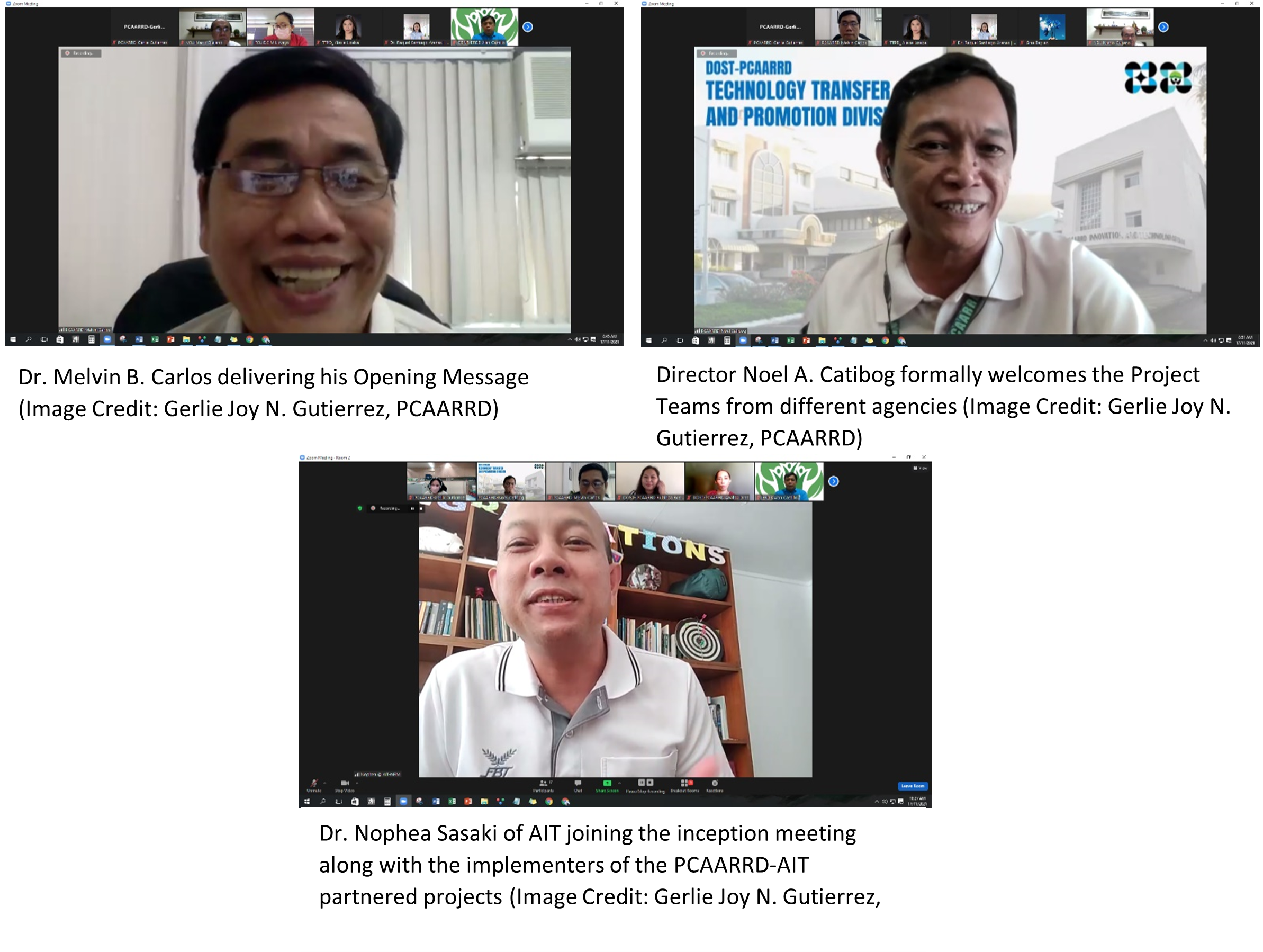
Ten newly approved projects of the Philippine Council for Agriculture, Aquatic and Natural Resources Research and Development of the Department of Science and Technology (DOST-PCAARRD) will focus on COVID-19 response as well as deployment and extension.
The projects will be implemented by various State Universities and Colleges (SUCs) and institutions in the country including Ifugao State Univerity (IfSU), Central Luzon State University (CLSU), Environmental Research and Development Bureau (ERDB), Bureau of Plant Industry – Los Baños Crop Research, Development and Production Support Center (BPI-LBCRDPSC), Laguna State Polytechnic University (LSPU), Cavite State University (CvSU), Visayas State University (VSU), and Mindanao State University (MSU – Maguindanao Campus).
An inception meeting on November 17, 2021, marked the start of the projects.
In his message, Dr. Melvin B. Carlos, Deputy Executive Director for Administration, Resource Management and Support Services (OED-ARMSS) of DOST-PCAARRD, highlighted that this is the first time that an inception meeting was held all at the same time for different projects with different agencies. He emphasized that these projects will ensure that the “technologies are not just developed and tested multi-location, but this time, they can really perform in the communities beyond the station, beyond laboratories, and really make a positive impact to communities and farmer groups, and other stakeholders.” He reminded the project proponents and the Technology Transfer and Promotion Division (TTPD) staff to wear extension hats when implementing the projects and make the most out of it.
Director Noel A. Catibog of TTPD, on the other hand, highlighted the importance of the inception meeting wherein the Grants-In-Aid (GIA) guidelines and the details of implementation mechanisms were discussed. He said that the guidelines would also help in monitoring and evaluation of the projects. Director Catibog also mentioned that the division is responsible for all the projects as these are under the guidance of the TTPD. Further, he assured the project proponents that the division will always be around to help and guide them along with the project implementation.
Ms. Ma. Alexie dS. Lizaba, Science Research Specialist, discussed the GIA guidelines. Several queries about commitment letters, implementation date, fund release, and procurement among others were tackled during the open forum.
Two breakout rooms were created to efficiently facilitate the presentation of the 10 projects. The first room is composed of the three projects under the partnership of DOST-PCAARRD with Thailand’s Asian Institute of Technology (AIT) while the second room is composed of five projects related to COVID-19 response, one community-based resilience livelihood program, and one Integrated Diversified Farming System (IDFS) project.
In the first room, three projects were presented: 1) Implementation of S&T-Based Climate Smart Soil and Water Management in the Highlands of Maguindanao; 2) Enhancing the Adoption and Transfer of Phenology-Based Bamboo Mapping and GIS-Based Mapping of Potential Areas Suitable for Commercial Bamboo in Selected Areas of the Philippines; and 3) Mainstreaming of Bamboost App as an Online Marketing Platform of Bamboo Farmers in Select Science and Technology Community-Based Farms (STCBF) Sites.

Dr. Nophea Sasaki, Chairman of the Department of Development and Sustainability in the School of Environment, Resources and Development of AIT in Thailand, along with Dr. Melvin B. Carlos, Director Catibog, TTPD staff, as well as the project implementers were present during the presentation of the PCAARRD-AIT projects.
Meanwhile, seven projects were presented in the other breakout room: 1) Enhancing the Sweet Potato Food Value Chain through Smart Technologies and Partnerships towards Food Resiliency in the New Normal in Western Samar of VSU; 2) Project HAGABI (Phase 2): Improving Vegetable, Animal, and Aquatic Production in Ifugao of IfSU; 3) Touching the Lives and Assisting 4Ps Beneficiaries in Talugtug Nueva Ecija During Pandemic and 4) CLAARRDEC’s Response to COVID19: Pilot Production and Distribution of Naturally Fortified Organic Brown Rice-based Products in Central Luzon of CLSU; 5) Strengthening Empowerment of Los Baños Communities through Science-Based Home and Community Gardening of BPI-LBNCRDPSC; 6) Establishment of Off-Campus Integrated Diversified Farming System (IDFS) Demonstration, Production, and Experimental Areas of CvSU; and 7) Community-based Rollout of Tilanggit Production Technology: A Resilience Livelihood Program for Vulnerable Lakeshore Families of Los Baños, Province of Laguna of LSPU.
The first five projects are classified under the GALING-PCAARRD program, the COVID-19 response initiative of the Council. Meanwhile, the latter two projects will showcase the Integrated Diversified Farming System (IDFS) that will cater to tourists/hobbyists, students, and other SUCs in the future as well as provide a resilience livelihood program for vulnerable lakeshore families.
To strengthen PCAARRD’s partnerships and collaborations with international partners, a Memorandum of Understanding has been signed with AIT. The first three projects are among the PCAARRD-funded projects that will be carried out in collaboration with AIT experts. This new collaboration with AIT stems from PCAARRD's Global Technology and Information Search (GTIS) Program and benchmarking activity on best practices in science and technology administration to improve its management and utilization.
In his remarks, Assistant Director and Supervising Research Specialist, Mr. Jose Tomas Cabagay thanked all the participants and hoped that the division would help in the smooth implementation of the projects (Crissar Joy D. Mundin and Gerlie Joy N. Gutierrez, DOST-PCAARRD S&T Media Services).
